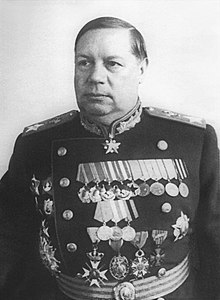
Back فيودور تولبوخين Arabic فيودور تولبوخين ARZ Fyodor Tolbuxin Azerbaijani Толбухин Фёдор Иванович Bashkir Фёдар Іванавіч Талбухін Byelorussian Фьодор Толбухин Bulgarian Fiódor Tolbukhin Catalan Fjodor Tolbuchin Czech Толбухин Фёдор Иванович CV Fjodor Iwanowitsch Tolbuchin German
Fyodor Ivanovich Tolbukhin | |
|---|---|
 Fyodor Tolbukhin in 1945 | |
| Native name | Фёдор Иванович Толбухин |
| Nickname(s) | Fedya |
| Born | 16 June 1894 Androniki, Yaroslavl Governorate, Russian Empire |
| Died | 17 October 1949 (aged 55) Moscow, Russian SFSR, Soviet Union |
| Buried | |
| Allegiance | |
| Service | Imperial Russian Army Red Army Soviet Army |
| Years of service | 1914–1949 |
| Rank | Marshal of the Soviet Union (1944–1949) |
| Commands | 4th Ukrainian Front 3rd Ukrainian Front Transcaucasian Military District |
| Battles / wars | World War I Russian Civil War World War II |
| Awards | Hero of the Soviet Union Order of Victory |
| Alma mater | M. V. Frunze Military Academy |
Fyodor Ivanovich Tolbukhin (Russian: Фёдор Ива́нович Толбу́хин; 16 June 1894 – 17 October 1949) was a Soviet military commander and Marshal of the Soviet Union. He is regarded as one of the finest Soviet generals of World War II.
Born into a peasant family in Yaroslavl, Tolbukhin volunteered for the Imperial Russian Army during the First World War and served with distinction. He joined the Red Army in 1918 and fought in the Russian Civil War. After graduating from the Frunze Military Academy, he held a succession of commands, rising to the post of chief of staff of the Transcaucasian Military District by 1938. Tolbukhin rose further through the ranks following the German invasion of the Soviet Union, and was involved in the Battle of Stalingrad. As commander of the 4th Ukrainian Front, he assisted Rodion Malinovsky in the Lower Dnieper and Dnieper–Carpathian offensives. He then contributed to the Soviet drive into the Balkans and forced Romania's defection to the Allies, for which he was named a Marshal of the Soviet Union. Afterwards, Tolbukhin took part in the occupation of Bulgaria and liberated much of Yugoslavia after the Belgrade offensive. He commanded the Vienna offensive in May 1945 and helped set up the new Austrian government under Karl Renner.
After the war, Tolbukhin received command of the Southern Group of Forces in the Balkans before returning to the Transcaucasus. He held the post until his death in October 1949 from diabetes.